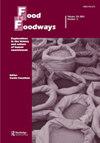Old abattoirs and new food politics: Sharing food and eating together at the meat market of Brussels
IF 1.1
Q2 ANTHROPOLOGY
引用次数: 1
Abstract
Abstract In 2012 in a formerly abandoned meat market in Brussels, Belgium, an NGO was founded to produce social inclusion programs and transform an under-used urban space into a community hub. In attempting to fulfill its goal, the founders, staff, and volunteers have used surplus unsold market produce that would otherwise have been discarded in order to fuel several programs, by inviting people to take food or to come and share a meal. This article is an ethnographic study of those efforts that rely on food waste to promote community engagement, and considers them as alternative forms of “scrappy collaboration” and commensality. In probing “scrappy collaboration” as a framework for understanding food sharing in a modern European capital, the article investigates the use of food waste to produce social inclusion as well as to provide a means of both subsistence and resistance.旧屠宰场与新食品政治:在布鲁塞尔的肉类市场共享食物
2012年,在比利时布鲁塞尔一个废弃的肉类市场上,一个非政府组织成立,旨在开展社会包容项目,并将未充分利用的城市空间转变为社区中心。为了实现这一目标,创始人、员工和志愿者利用剩余的未售出的市场产品,通过邀请人们带走食物或来分享一顿饭,为几个项目提供燃料,否则这些产品就会被丢弃。这篇文章是对那些依靠食物浪费来促进社区参与的努力的民族志研究,并认为它们是“零星合作”和共生的另一种形式。在探索“零星合作”作为理解现代欧洲首都食物共享的框架时,文章调查了利用食物垃圾来产生社会包容以及提供生存和抵抗的手段。
本文章由计算机程序翻译,如有差异,请以英文原文为准。
求助全文
约1分钟内获得全文
求助全文
来源期刊

Food and Foodways
ANTHROPOLOGY-
CiteScore
2.20
自引率
0.00%
发文量
16
期刊介绍:
Food and Foodways is a refereed, interdisciplinary, and international journal devoted to publishing original scholarly articles on the history and culture of human nourishment. By reflecting on the role food plays in human relations, this unique journal explores the powerful but often subtle ways in which food has shaped, and shapes, our lives socially, economically, politically, mentally, nutritionally, and morally. Because food is a pervasive social phenomenon, it cannot be approached by any one discipline. We encourage articles that engage dialogue, debate, and exchange across disciplines.
 求助内容:
求助内容: 应助结果提醒方式:
应助结果提醒方式:


